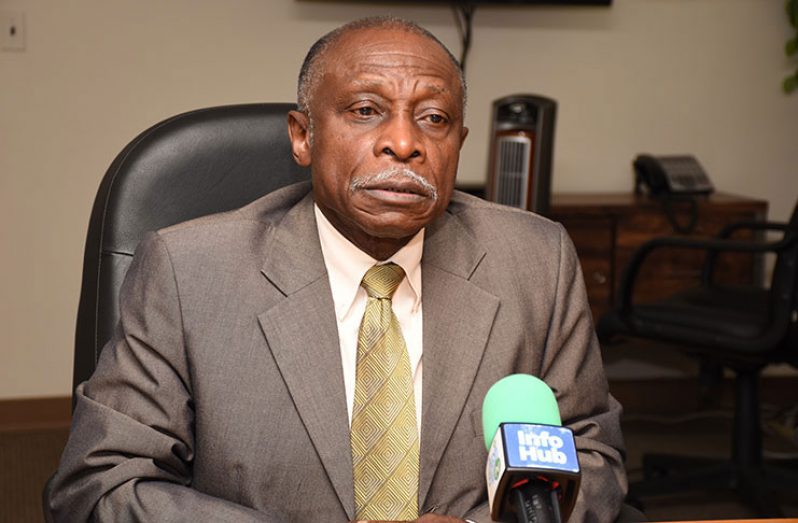— oil companies must respect labour law, says foreign secretary
OIL companies have to respect Guyanese laws and treat all workers in accordance with the law, but the Department of Labour has not attracted sufficient attention and their efforts to bring in line foreign companies have been unsatisfactory.
This is according to Foreign Secretary at the Ministry of Foreign Affairs, Carl Greenidge, on a programme titled ‘INSIGHT’ hosted Friday on VOG 102.5FM.
Recently, the Guyana Trades Union Congress (GTUC) General-Secretary, Lincoln Lewis, called on the government and Opposition People’s Progressive Party (PPP) to get foreign oil and gas companies here to respect workers’ right to join a union.
Article 147 of the Constitution which deals with protection of freedom of assembly and association, Lewis said, must be respected.
The foreign secretary said the law, as it stands, if competently implemented, will allows for employers to “toe the line” as regards to employment practices, non-discrimination and a variety of other mechanisms.
“We have had major multinationals such as Alcoa, and during its time, was one of the world’s largest enterprises, subsequently broken down into Alcan, Dember and Guymine,” he said.
Currently, Alcoa is an American industrial corporation. It is the world’s eighth largest producer of aluminum and is headquartered in Pittsburgh, Pennsylvania.
Greenidge said during this period in Guyana, work was done with these companies who followed the rules.
However, the foreign secretary said having companies operate out at sea and miles away from the City creates a challenge in physically monitoring what is going one, who is employed, when are they on or off the oil rig, among other dynamics.
He said standard operating practices must be acknowledged.
“Issues that are now arising out of the petroleum sector have arisen and have not been properly attended, it is a controversial view, but it’s my assessment and I have had the privilege of dealing with some of these problems before, we have had problems with bauxite companies; forestry companies and it therefore sometimes require condign action in order to have large companies toe the line,” the foreign secretary said.
COMPLICATED
Underscoring that the problems in the petroleum sector are complicated, Greenidge said the Labour Department must now equip themselves to deal with new problems.
“You have now Exxon giving out contracts to Trinidadians, Exxon giving out contracts to US companies; contracts to Caribbean companies and these companies are choosing to operate their own methods,” he said.
In giving an example, Greenidge said there are some persons in New Amsterdam, Berbice who had worked in the petroleum sector overseas and who were contacted through Exxon and had written to the authorities noting significant discrimination.
“This discrimination is really surprising given that here is an independent state, you find that a worker who is non-Guyanese is given a longer contract than the Guyanese, the terms and conditions of pay are less favourable for the Guyanese and they have appealed to us and called on us to remedy this,” the foreign secretary said.
Usually, he said the Labour Department should visit Exxon but then the oil company would say they did not actually recruit anyone who complained and reviewing contracts is not possible since they did not issue such to those employees.
“I don’t believe, since any exchange with ExxonMobil, a great deal of progress has been made in respect of harnessing the sub-contractors, and the sub-contractors with a view of ensuring that they abide by the laws of Guyana,” he said.
These laws, he said, are usually avoided while operating on high seas and Guyanese who usually complain have unorthodox contracts which prohibit them from joining unions and disclosing emoluments.
“The laws of Guyana are very clear on these matters. The laws are very clear on the Exclusive Economic Zone. The Ministry of Foreign Affairs which is currently in the process of coordinating work of the agencies in charge of implementing these laws, has reminded all the parties that the laws in question effectively convert the rigs and anything operating on the economic shelf, they have to abide by the law as if they are on the land, in other words, they have no special rights out there exempting them from Guyana’s laws,” the foreign secretary said.
He said all oil companies have to respect Guyana’s laws and treat all workers in accordance with the law and the agencies responsible for their enforcement will be called upon and encouraged to abide by their mandate.
“You can’t be afraid because it’s a foreign company, by the same token you are not supposed to be terrorising companies since there are laws, the government agencies must ensure that businesses and sub-contractors abide by the law,” Greenidge said.
He said this is currently a work in progress because of the novelty of the economic zones.
“If ExxonMobil can’t do it in the UK or Papua New Guinea or Trinidad and Tobago or because the law prohibits it, then they must not do it here, in other words, Guyanese workers and citizens have rights, and they have to be respected,” the foreign secretary said.
He added: “You cannot discriminate against Guyanese in a territory that is Guyanese and where laws of Guyana govern them.”



.jpg)









